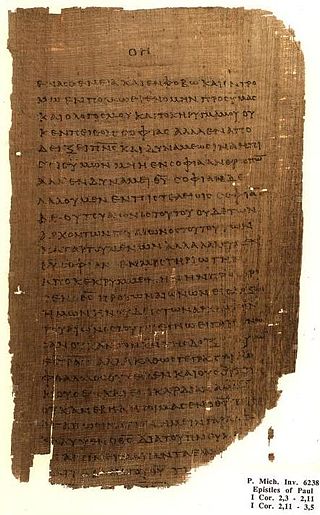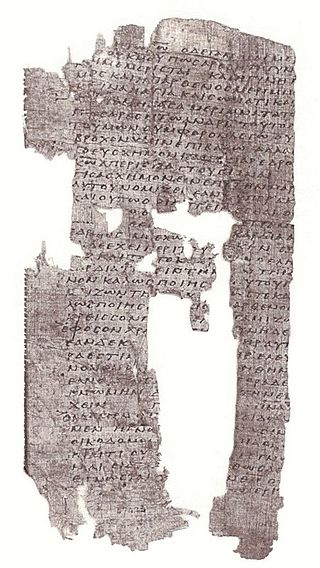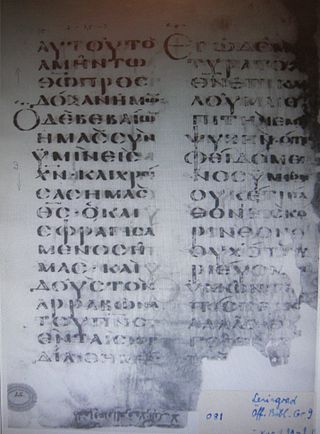
Acts 3 is the third chapter of the Acts of the Apostles in the New Testament of the Christian Bible. The book containing this chapter is anonymous but early Christian tradition affirmed that Luke composed this book as well as the Gospel of Luke. This chapter records the healing of a disabled person by the apostles Peter and John, and Peter's preaching at Solomon's Porch in the Second Temple.
Acts 20 is the twentieth chapter of the Acts of the Apostles in the Christian New Testament of the Bible. It records the third missionary journey of Paul the Apostle. The narrator and his companions ("we") play an active part in the developments in this chapter. The book containing this chapter is anonymous, but early Christian tradition uniformly affirmed that Luke the Evangelist composed this book as well as the Gospel of Luke.

Romans 11 is the eleventh chapter of the Epistle to the Romans in the New Testament of the Christian Bible. It is authored by Paul the Apostle, while he was in Corinth in the mid-50s AD, with the help of an amanuensis (secretary), Tertius, who adds his own greeting in Romans 16:22.

Romans 12 is the twelfth chapter of the Epistle to the Romans in the New Testament of the Christian Bible. It is authored by Paul the Apostle, while he was in Corinth in the mid-50s AD, with the help of an amanuensis (secretary), Tertius, who adds his own greeting in Romans 16:22.

1 Corinthians 2 is the second chapter of the First Epistle to the Corinthians in the New Testament of the Christian Bible. It is authored by Paul the Apostle and Sosthenes in Ephesus, composed between 52–55 CE.

1 Corinthians 3 is the third chapter of the First Epistle to the Corinthians in the New Testament of the Christian Bible. It is authored by Paul the Apostle and Sosthenes in Ephesus, composed between 52–55 CE. In this chapter, Paul begins to deal with the issue of factionalism in the Corinthian church which is one of his main reasons for writing the letter.

1 Corinthians 4 is the fourth chapter of the First Epistle to the Corinthians in the New Testament of the Christian Bible. It is authored by Paul the Apostle and Sosthenes in Ephesus, composed between 52–55 CE. Paul continues to confront the factionalism of the Corinthian church and describes the role of an apostle.

1 Corinthians 7 is the seventh chapter of the First Epistle to the Corinthians in the New Testament of the Christian Bible. It is authored by Paul the Apostle, a citizen of Tarsus and Sosthenes in Ephesus. In this chapter, Paul replies to certain questions raised by the Corinthian church in a letter sent to him.

1 Corinthians 16 is the sixteenth and final chapter of the First Epistle to the Corinthians in the New Testament of the Christian Bible. It is authored by Paul the Apostle and Sosthenes in Ephesus, composed between 52–55 CE, and sent to the church in Corinth. This chapter contains the closing statements of the letter, with Paul's travel plans, final instructions, and greetings. Verse 8 confirms that Paul was in Ephesus when the letter was composed, and verse 21 confirms that the majority of the letter was scribed by an amanuensis.

2 Corinthians 1 is the first chapter of the Second Epistle to the Corinthians in the New Testament of the Christian Bible. It is authored by Paul the Apostle and Timothy in Macedonia in 55–56 CE.

2 Corinthians 2 is the second chapter of the Second Epistle to the Corinthians in the New Testament of the Christian Bible. It is authored by Paul the Apostle and Timothy in Macedonia in 55–56 CE.

2 Corinthians 3 is the third chapter of the Second Epistle to the Corinthians in the New Testament of the Christian Bible. It is authored by Paul the Apostle and Timothy in Macedonia in 55–56 AD/CE. Biblical commentator Heinrich Meyer emphasises that the use of the plural 'we' in 2 Corinthians 3:2 and 2 Corinthians 3:6 includes Timothy in the writing of the letter.

2 Corinthians 6 is the sixth chapter of the Second Epistle to the Corinthians in the New Testament of the Christian Bible. It is authored by Paul the Apostle and Timothy in Macedonia in 55–56 CE.

2 Corinthians 7 is the seventh chapter of the Second Epistle to the Corinthians in the New Testament of the Christian Bible. It is authored by Paul the Apostle and Timothy in Macedonia in 55–56 CE.

2 Corinthians 10 is the tenth chapter of the Second Epistle to the Corinthians in the New Testament of the Christian Bible. It is authored by Paul the Apostle and Timothy in Macedonia in 55–56 CE. According to theologian Heinrich August Wilhelm Meyer, chapters 10–13 "contain the third chief section of the Epistle, the apostle's polemic vindication of his apostolic dignity and efficiency, and then the conclusion".

2 Corinthians 11 is the eleventh chapter of the Second Epistle to the Corinthians in the New Testament of the Christian Bible. It is authored by Paul the Apostle and Timothy in Macedonia in 55–56 CE. According to theologian Heinrich August Wilhelm Meyer, chapters 10–13 "contain the third chief section of the Epistle, the apostle's polemic vindication of his apostolic dignity and efficiency, and then the conclusion".

2 Corinthians 13 is the thirteenth and final chapter of the Second Epistle to the Corinthians in the New Testament of the Christian Bible. It is authored by Paul the Apostle and Timothy in Macedonia in 55–56 CE.

Galatians 1 is the first chapter of the Epistle to the Galatians in the New Testament of the Christian Bible. It is authored by Paul the Apostle for the churches in Galatia, written between 49 and 58 AD. This chapter contains Paul's significant exposition concerning the significance of God's revelation of Jesus Christ.

Ephesians 1 is the first chapter of the Epistle to the Ephesians in the New Testament of the Christian Bible. Traditionally, it is believed to have been written by Apostle Paul while he was in prison in Rome, but more recently, it has been suggested that it was written between AD 80 and 100 by another writer using Paul's name and style. This chapter contains the greeting, followed by a section about "The Blessing of God" and Paul's prayer.

Ephesians 4 is the fourth chapter of the Epistle to the Ephesians in the New Testament of the Christian Bible. Traditionally, it is believed to have been written by Apostle Paul while he was in prison in Rome, but more recently, it has been suggested that it was written between AD 80 and 100 by another writer using Paul's name and style. This chapter is a part of Paul's exhortation, with the particular section about the mutual interdependence of the Christians as the church and how they should live in the world (4:17–5:20).











